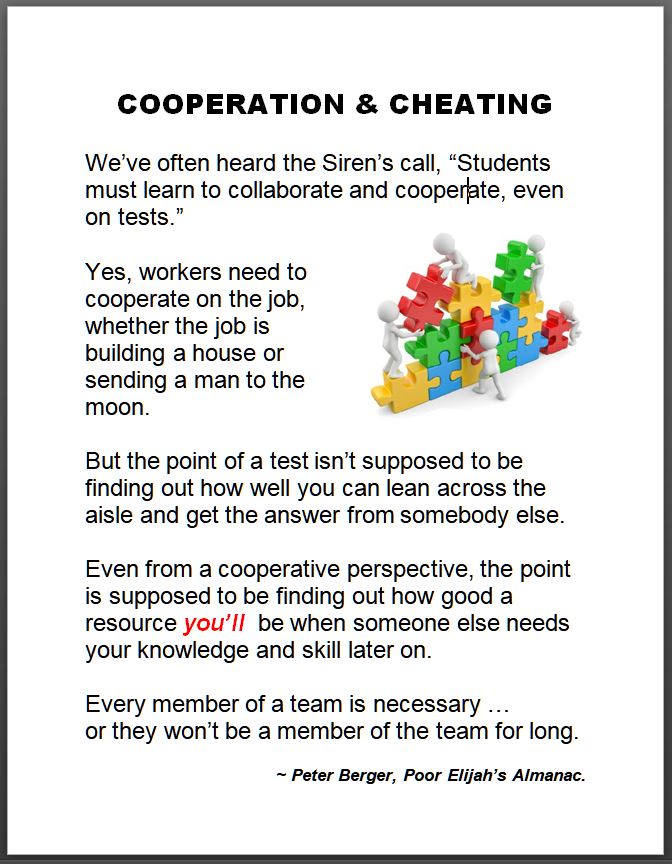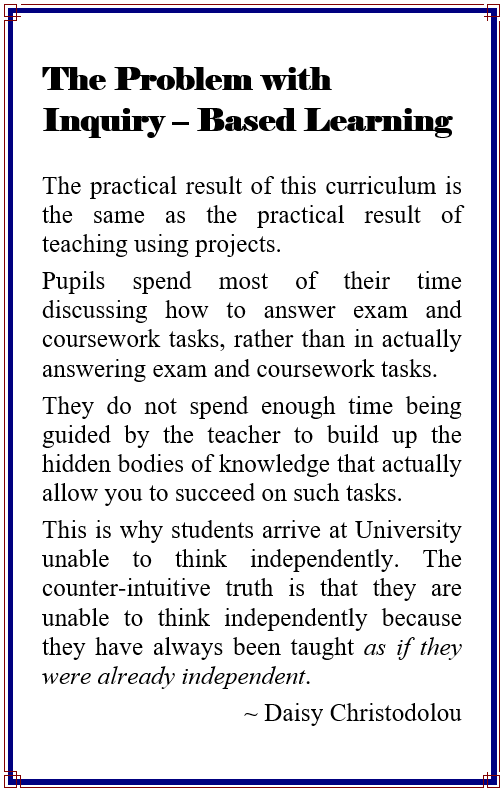12 of 28 Items .... Course: Teacher Education
Problems, Questions, and Puzzles to spark discussion and argument in the maths classroom.
. . . View This Fullsize
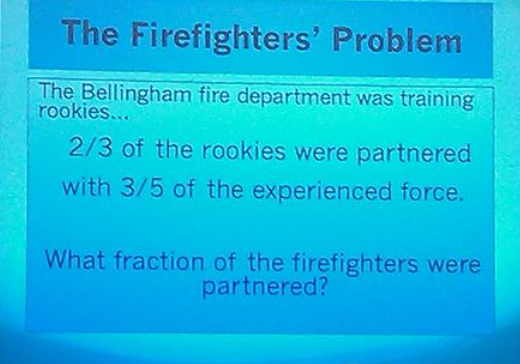
What insights does a student need to have before this problem is solvable?
.: [Teacher Education], [T.R.Milne], [Number Theory].
. . . View This Fullsize
There are several ways to teach multiplication. Many people seem to feel that students know best how they learn, so I'm asking students to weigh in on this particular issue.
Which method is best? Is there a difference between what we should be doing with elementary students and with high school students? With how much and with what do students need to graduate high school and enter the RealWorld?
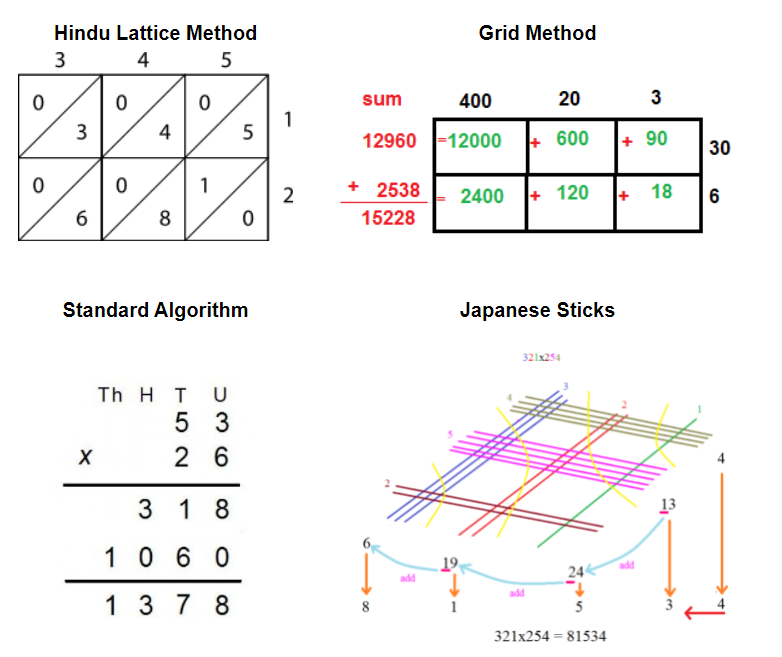
.: [Teacher Education], [internet], [DebateMath].
. . . View This Fullsize
In a fascinating bit of testimony before a Michigan Senate Hearing, this slide was presented. The presenter (Dr. Ball) asked the legislators to identify where and how the 4th-grade solvers made their mistakes.
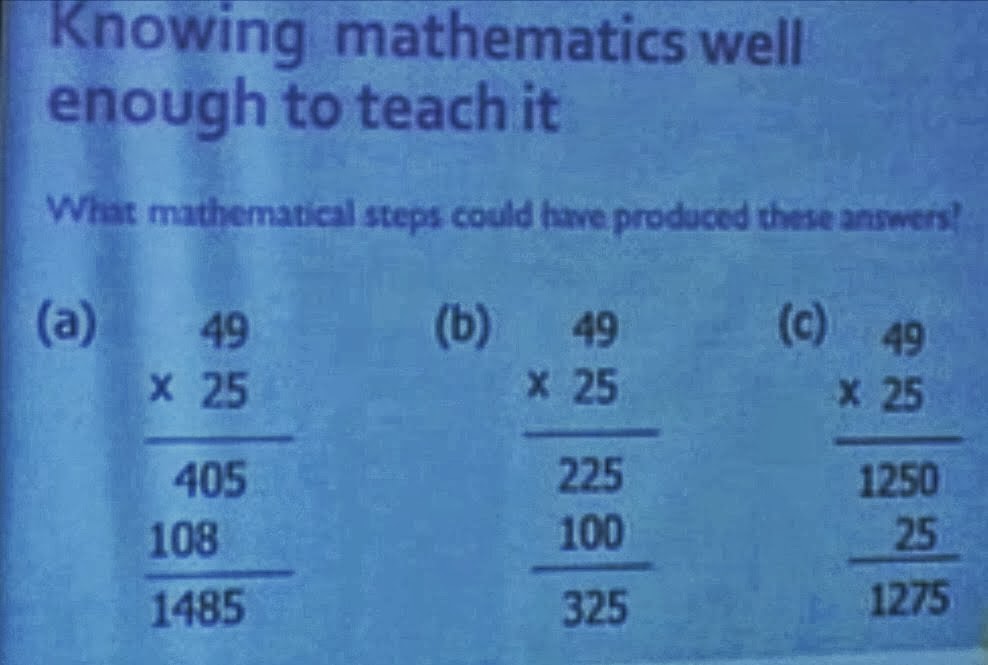
David Wees asks:
"What is the mistake?"
"What is the thinking that led to this mistake?"
I saw both for (b) and (c) but the train of thought in (a) escaped me completely. What do you think happened in (a)?
What would you tell the students in each case?
.: [Teacher Education], [David Wees], [Find the Error].
. . . View This Fullsize
Philosophy professor Keith Parsons
Message to My Freshman Students:
"Lecture, we are told, is an ineffective strategy for reaching today's young people, whose attention span is measured in nanoseconds ..."
Hogwash.
You need to learn to listen. The kind of listening you need to learn is not passive absorption, like watching TV; it is critical listening.
Critical listening means that you are not just hearing but thinking about what you are hearing.
Critical listening questions and evaluates what is being said and seeks key concepts and unifying themes.

.: [Teacher Education], [internet], [DebateMath].
. . . View This Fullsize
Could you teach kids without using grades?
Would kids learn without using grades?
Should we be using grades?
.: [Teacher Education], [T.R.Milne], [DebateMath].
. . . View This Fullsize
Here are some questions (to teach precalc & stats):
What's a logarithm?
What's a situation in which mean & median are different & one might be preferable?
How do you see math & social justice combining?
What's your fave math thing?
Then: minilesson on what Ss are learning. I think a minilesson is good & especially if it's on the material they'd be broaching. More interested in familiarity with content & pedagogical moves than a pre-polished lesson.
I also asked about math/gender since I teach at a girls school.
Views/whys on tracking also good.
.: [Teacher Education], [Benjamin Dickman], [Pedagogy].
. . . View This Fullsize
1) What is math?
2) What's an interesting math problem you've recently solved?
3) How can you tell if the structure (rather than content) of a lesson you've taught was effective?
.: [Teacher Education], [internet], [Pedagogy].
. . . View This Fullsize
This quote should be on the cover of our national curriculum:
"Information is not knowledge, knowledge is not wisdom."
Pupils should gain knowledge and understanding about becoming informed citizens including human rights, the diverse national, regional, religious and ethnic identities in the United Kingdom, the media's role in society, including the internet, wider issues and challenges of global interdependence and responsibility, including sustainable development and Local Agenda 21.
Pupils should develop the skills of enquiry and communication including researching political, moral, social issues, problems or event by analysing information from different sources, showing an awareness of the use and abuse of statistics, expressing, justifying and defending orally and in writing personal opinions about them, and contributing to group and exploratory class discussions and debates.
~ James Gleick
.: [Teacher Education], [internet], [DebateMath].
. . . View This Fullsize
From our recent group True-False quiz:
Two of these had correct response rates of 90%, the other two 60%. Which are which?
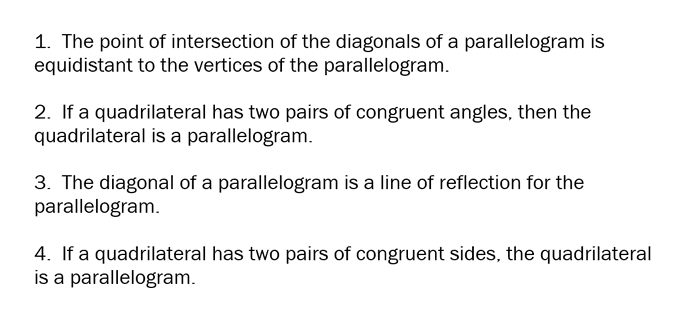
.: [Teacher Education], [Frank Noschese], [Pedagogy].
